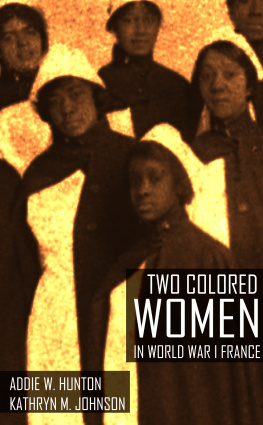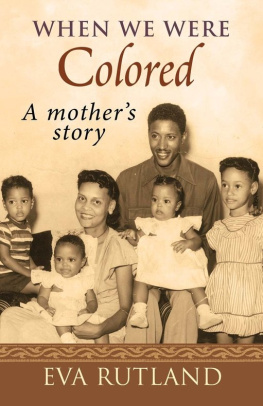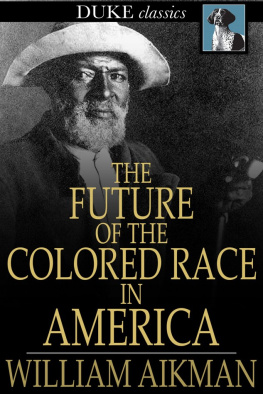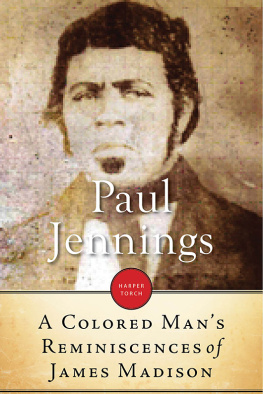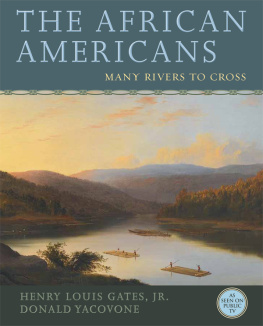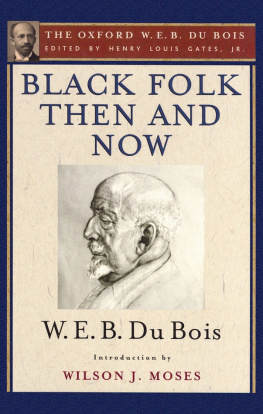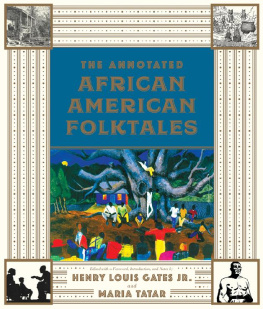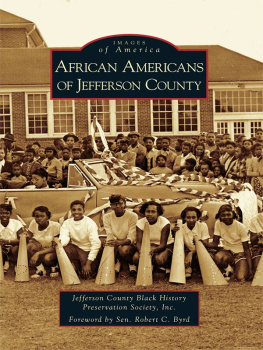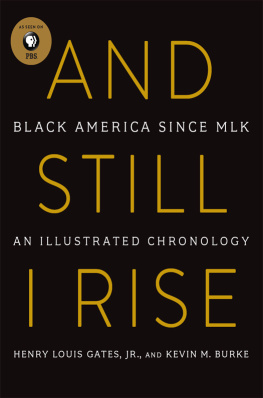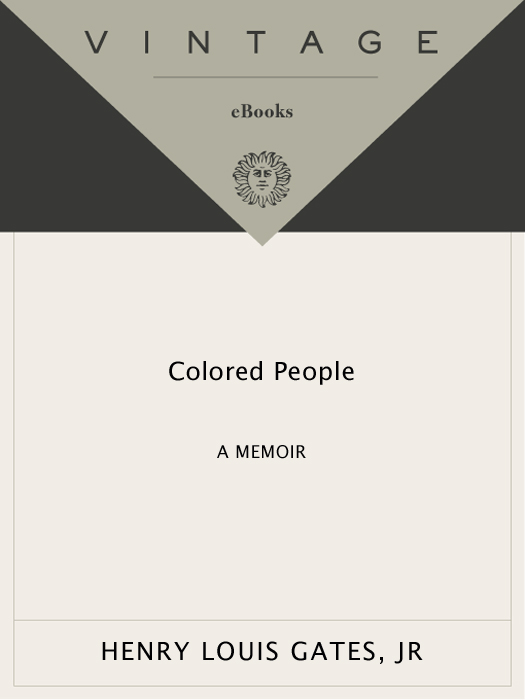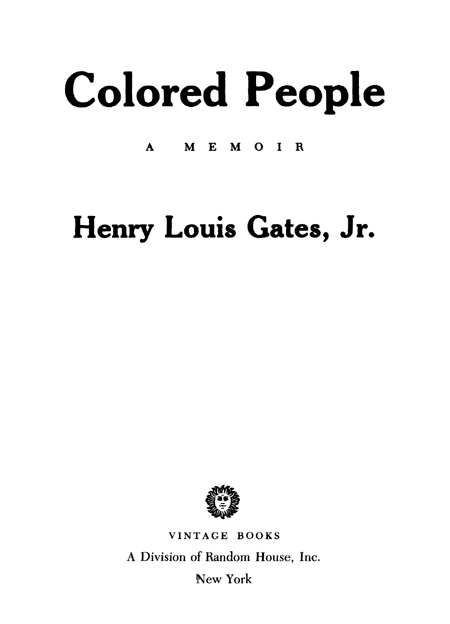Acclaim forHenry Louis Gates, Jr.s
Colored People
This book may well become a classic of American memoir. In reading it one is strongly reminded of Jill Ker Conways The Road From Coorain or Willie Morriss North Toward Home. Fearless in his use of language and his descriptions of attitudes Gates has made every word tell.
Boston Globe
Joyfully exuberant what distinguishes Colored People most is its great good humor. That and its irrepressible sense of life.
The New York Times
Children arent reared by a family alone but also by a community. The community in which [Gates] matured believed in itself. Colored People is a warm memoir of a strong family in a small town. Im sure theyre delighted with Gates. He did them proud.
Nikki Giovanni, Lexington Herald-Ledger
Vivid moving a testament to a humanity that is neither colorless nor reducible to color.
Chicago Tribune
Masterful no other American academic writes prose this readable, this funny and this full of hard-won insight.
Bill McKibben, New York Daily News
Gates is writing with infectious love and humor. A marvelous, rhythmic, and warm memoir, full of wonderful people, family customs, anecdotes and foibles. A celebration.
Christian Science Monitor
BOOKS BY Henry Louis Gates, Jr.
Colored People
Loose Canons
Figures in Black
The Signifying Monkey
Henry Louis Gates, Jr.
Colored People
Henry Louis Gates, Jr., was born and raised in Mineral County, West Virginia. He graduated summa cum laude from Yale with a degree in history and was a London correspondent for Time magazine before receiving his Ph.D. in English from Cambridge University. He writes frequently for such publications as Harpers, The New York Times Book Review, The New Yorker, and The Village Voice; his books include Figures in Black, The Signifying Monkey (for which he received an American Book Award), and Loose Canons. He is now W. E. B. Du Bois Professor of the Humanities and Chair of the Department of Afro-American Studies at Harvard University.
FIRST VINTAGE BOOKS EDITION, APRIL 1995
Copyright 1994 by Henry Louis Gates, Jr.
All rights reserved under International and Pan-American Copyright Conventions. Published in the United States by Vintage Books, a division of Random House, Inc., New York, and simultaneously in Canada by Random House of Canada Limited, Toronto. Originally published in hardcover by Alfred A. Knopf, Inc., New York, in 1994.
A portion of this work was originally published in The New Yorker.
Some of the names in this narrative have been changed.
The Library of Congress has cataloged the Knopf edition as follows:
Cates, Henry Louis.
Colored people / by Henry Louis Cates, Jr. 1st ed.
p. cm.
eISBN: 978-0-307-76443-0
1. Cates, Henry LouisChildhood and youth.
2. Afro-AmericansWest VirginiaSocial life and
customs. 3. Afro-American scholarsUnited States
Biography. 4. CriticsUnited StatesBiography. I. Title.
PS29.C28A3 1993
975.400496073092dc-20 93-12256
[B]
v3.1
I remember the very day when I became colored.
ZORA NEALE HURSTON
How dare anyone, parent, schoolteacher, or merely literary critic, tell me not to act colored?
ARNA BONTEMPS
For Henry Louis Gates, Sr.,
and in memory of
Pauline Augusta Coleman Gates
Contents
Preface
Dear Maggie and Liza:
I have written to you because a world into which I was born, a world that nurtured and sustained me, has mysteriously disappeared. My darkest fear is that Piedmont, West Virginia, will cease to exist, if some executives on Park Avenue decide that it is more profitable to build a completely new paper mill elsewhere than to overhaul one a century old. Then they would close it, just as they did in Cumberland with Celanese, and Pittsburgh Plate Glass, and the Kelly-Springfield Tire Company. The town will die, but our people will not move. They will not be moved. Because for them, Piedmontsnuggled between the Allegheny Mountains and the Potomac River Valleyis life itself.
I have written to you because of the day when we were driving home and you asked your mother and me just exactly what the civil rights movement had been all about and I pointed to a motel on Route 2 and said that at one time I could not have stayed there. Your mother could have stayed there, but your mother couldnt have stayed there with me. And you kids looked at us like we were telling you the biggest lie you had ever heard. So I thought about writing to you.
I have written for another reason, as well. I remember that once we were walking in Washington, D.C., heading for the National Zoo, and you asked me if I had known the man to whom I had just spoken. I said no. And, Liza, you volunteered that you found it embarrassing that I would speak to a complete stranger on the street. It called to mind a trip Id made to Pittsburgh with my father. On the way from his friend Mr. Ozzie Washingtons sisters house, I heard Daddy speak to a colored man, then saw him tip his hat to the mans wife. (Daddy liked nice hats: Caterpillar hats for work, Dobbs hats for Sunday.) Its just something that you do, he said, when I asked him if he had known those people and why had he spoken to them.
Last summer, I sat at a sidewalk cafe in Italy, and three or four black Italians walked casually by, as well as a dozen or more blacker Africans. Each spoke to me; rather, each nodded his head slightly or acknowledged me by a glance, ever so subtly. When I was growing up, we always did this with each other, passing boats in a sea of white folk.
Yet there were certain Negroes who would avoid acknowledging you in this way in an integrated setting, especially if the two of you were the ones doing the integrating. Dont go over there with those white people if all youre going to do is Jim Crow yourselvesDaddy must have said that to me a thousand times. And by that I think he meant we shouldnt cling to each other out of habit or fear, or use protective coloration to evade the risks of living like any other human being, or use clannishness as a cop-out for exploring ourselves and possibly making new selves, forged in the crucible of integration. Your black ass, hed laugh, is integrated already.
But there are other reasons that people distrust the reflexthe nod, the glance, the murmured greeting.
One reason is a resentment at being lumped together with thirty million African Americans whom you dont know and most of whom you will never know. Completely by the accident of racism, we have been bound together with people with whom we may or may not have something in common, just because we are black. Thirty million Americans are black, and thirty million is a lot of people. One day you wonder: What do the misdeeds of a Mike Tyson have to do with me? So why do I feel implicated? And how can I not feel racial recrimination when I can feel racial pride?
Then, too, there were Negroes who were embarrassed about being Negroes, who didnt want to be bothered with race and with other black people. One of the more painful things about being colored was being colored in public around other colored people, who were embarrassed to be colored and embarrassed that we


